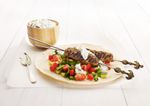'How my anxiety and depression make losing weight even more difficult'
by Shannon Crane, Media & Communications Advisor
- October 13, 2017
- Leave a comment
- Healthy eating
- Weight Management
- Junk Food
- Meal Plan
- Psychology
- Personal Stories
- Women's Health
- Healthy Champion
- Mental Health
To coincide with Mental Health Week (8-14 October), we asked our healthy lifestyle champion Andrea to tell us about the challenges of dealing with depression and anxiety while also trying to lose weight. Andrea says it's not always easy to stay on track when things go wrong, her mood takes a dive or anxiety sets in.

What are the challenges you face around food and coping with a mental illness?
I’ve always reached for food when I’ve needed comfort. I’ve come to understand why that happens but that doesn’t make it easier to stop. As a child, my family were not affectionate and I can only surmise that Mum making us a special dinner or giving us treats was her way of showing love. I know my sister won’t mind me sharing this story and it will give you an insight into how important food has been in our family. When my sister was a young girl, she had weight issues and had to see a dietician every week. Mum would take her for her weigh in and if she had lost weight, she’d take her to get deep fried chicken afterwards. That’s pretty messed up. Mum gave us food to make us happy and as a reward.
What are your biggest healthy eating challenges?
Lots of people have a sweet tooth and reach for cakes or other sweet treats but my biggest food loves are savoury. It might seem odd but my favourite food is sandwiches. If I am put in close proximity to sandwiches, I will eat them like a person who hasn’t seen food for a month. It’s incredibly hard to resist. I also find finger food, especially dips and bread, irresistible. The other food I find difficult to control myself around is potato chips; cheese and onion in particular. I can hoover down a bag of those in no time. When my mood is low and I eat a bag of chips, I feel better for a few minutes but then the guilt sets in and my mood gets worse. It’s a vicious circle and I can see it happening, but it’s sometimes seemingly impossible to stop.
How does your mood affect your food choices?
There are times when my mood is so low that I really cannot even be bothered thinking about what I am eating. At those times, it all just seems too hard. When my mood is good and I’m feeling on top of things, I can resist, well at least until the bag of chips is open! When my mood is taking a dive, I reach for the chips. When I’m bored, I make a sandwich. I also love to bake. I make and decorate cakes and cupcakes because I enjoy doing it. I don’t usually eat them although I do like to eat the batter. I give them to my friends and colleagues. It makes me feel happy to see others eating the food I have made. I guess that’s how Mum felt too. Baking is something I do to alleviate stress. All of the special occasions in my life have involved food. Eating together with people you love is such a lovely thing to do. We were never a sporty family so we didn’t go for walks or hikes or anything like that. We come from a long line of TV watchers who love to eat. A family reunion or event always involves mountains of food.
What helps with your mood?
I know, because I’ve experienced it before, that regular exercise will help my mood. I need to lift my game. I need to get back to the gym. Next week I am starting yoga classes at lunchtime at work once a week. I know all of the reasons I should eat well and exercise. I know all of the excuses I can make to myself. The lower my mood, the harder it is to get going but I always try to get back on track as soon as I can.
What else affects your health and weight?
There are times when I am quite sick and sometimes end up in hospital with asthma. Even if I avoid the ambulance and hospital, I have to take steroids which make me incredibly hungry. I’d go so far as to say ravenous! The steroids themselves cause me to retain fluid and when I take high doses for a longer time, they can contribute to weight gain. At those times I just have to go with it, try to make healthier choices and tell myself that it’s better to put on a little weight and be alive. Breathing is not optional! It’s a vicious cycle of needing the medication, taking it and getting better but then being annoyed and depressed that I have had a setback. I just have to keep getting back to it.
Regular physical activity and eating a healthy diet are good ways to help prevent or manage mild anxiety and depression, and they can also help you maintain or achieve a healthy weight. Below are some practical tips from beyondblue.
Keeping active: Keeping active can help you stay physically fit and mentally healthy.
Research shows that keeping active can:
- help lift mood through improved fitness and the release of natural chemicals in the brain
- help improve sleeping patterns
- increase energy levels
- help block negative thoughts and/or distract people from daily worries
- help people feel less alone if they exercise with others.
Physical activity increases your wellbeing. The current recommendation is at least 30 minutes of moderate intensity physical activity on most, and preferably all, days of the week. However, people with anxiety or depression may find it difficult to get started or get motivated, or continue to exercise on a long-term basis. For more info visit beyondblue.org.au/get-support/staying-well/keeping-active
Eating well: Food plays a vital role in maintaining physical and mental health. Eating a nourishing, balanced diet helps to give people an overall sense of wellbeing.
The Australian Dietary Guidelines suggest:
- Eat plenty of vegetables, legumes and fruits.
- Eat plenty of cereals, preferably wholegrain, such as breads, rice, pasta and noodles.
- Include lean meat, fish, poultry and/or alternatives.
- Include milks, yoghurts, cheeses and/or alternatives (preferably low-fat varieties).
- Drink plenty of water.
- Limit intake of foods containing saturated fat, added salt, added sugars and alcohol.
Find our more at beyondblue.org.au/get-support/staying-well/eating-well
If you would like assistance with your mental health, call the beyondblue support service line 1300 22 46 36 or visit beyondblue.org.au







